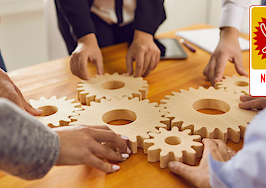Join the movement at Inman Connect Las Vegas, July 30 – Aug. 1! Seize the moment to take charge of the next era in real estate. Through immersive experiences, innovative formats and an unparalleled lineup of speakers, this gathering becomes more than a conference — it becomes a collaborative force shaping the future of our industry. Secure your tickets now!
In a world filled with stress and uncertainty, the practices of mindfulness and kindness are powerful tools for promoting mental well-being and personal growth.
A recent study from The Ohio State University provides valuable information that we, as agents, can use to enhance our personal experience of our work and the results we get in our business. In this overview of the research, you’ll find concrete practices and the benefits they provide so that you can live a life that’s more connected.
In today’s stressful marketplace and our ever-divided culture, adopting practices of mindfulness and kindness increases our effectiveness and our overall quality of life.
Understanding mindfulness
Dr. Maryanna Klatt, director of The Ohio State University College of Medicine’s Center for Integrative Medicine, describes mindfulness as being fully present in the moments of our lives, even during times of difficulty. Awareness and intentional presence allow individuals to navigate challenging circumstances without being overwhelmed by them.
While we’ll get into specific practices later, it’s important to note here that mindfulness is not just meditation and yoga. It’s not religious in any way. It’s also not an easy, instant fix. It takes intentional practice, but the important thing is that, with a little practice, mindfulness is available every moment.
As Dr. Klatt emphasizes, we can be intentional about our responses to our emotional reactions and thus use mindfulness to reshape our reality.
By focusing on the present and reframing our responses to life’s challenges, anyone can cultivate resilience and emotional balance and reap the benefits of that new relationship to life.
The impact of mindfulness practices
The OSU study shows the detailed effects of mindfulness practices, including yoga and meditation, listening to relaxing music, walking mindfully, and simply breathing mindfully.
These simple practices help individuals relax, center themselves and activate the parasympathetic nervous system, which is essential for relaxation and stress reduction.
By homing in on bodily awareness, reframing responses and leveraging the soothing effects of music and our breath, we can effectively manage our stress levels and cultivate a sense of inner peace.
When we are grounded, centered and relaxed, we perform better, and there is far more than anecdotal evidence for this assertion. A report from Psychology Today clearly demonstrates that when we are grounded and centered, business communications are vastly improved and more likely to lead to desirable outcomes.
Overcoming roadblocks
Dr. Klatt highlights the irony that our minds often serve as roadblocks to mindfulness.
The incessant rumination on past and future events can hinder the ability to remain fully present in the moment. This cognitive preoccupation with the past and future at the expense of the present underscores the challenge of achieving mindfulness.
Just notice how we approach a listing appointment when we’ve lost the last one or how it’s all too easy to have a fear of the future give us “commission breath.”
This underscores the importance of embracing the present moment, as avoiding present experiences can lead to a life of missed opportunities amidst endless mental distractions.
Understanding the common limitations of our time, Dr. Klatt notes that even just 10 minutes of daily meditation can yield significant benefits. Consistency, she says, matters more than duration.
Mindfulness: Not a cure-all
Dr. Klatt’s pioneering work with healthcare professionals and schoolchildren showcases the profound benefits of mindfulness in reducing stress and enhancing concentration. Through evidence-based interventions, healthcare professionals experienced reduced burnout, ultimately improving patient care.
Similarly, schoolchildren displayed increased abilities to concentrate and sustain attention, emphasizing the role of mindfulness in educational settings.
However, studies highlight potential pitfalls and downsides to mindfulness, so it’s important to approach this with an awareness of the full picture.
A study from the Harvard Business Review points out that employees who were often required to display inauthentic emotions reported lower job satisfaction and lower performance after practicing mindfulness.
It seems the more we dwell on the demand that we always be pleasant and helpful, even when we are not feeling that way, the less satisfied we become.
The Harvard study suggests that the way through this conflict is “deep acting,” that is, changing the way we feel to match the demand. A second study out of Harvard suggests that the type of mindfulness we practice can make the difference. In effect, a loving kindness approach will shift our orientation from us to the people we serve and boost our overall satisfaction and performance.
Navigating kindness and its psychological benefits
Dr. Jennifer Chevins, a professor working with Dr. Klatt, has explored the interplay between kindness and mental health.
Her research demonstrates that engaging in acts of kindness can significantly alleviate symptoms of depression and anxiety. Individuals with lower hope are empowered to develop hope through targeted interventions, contributing to improved resilience and emotional well-being.
The study out of Ohio State reflects the positive impact of practicing kindness not only on others but also on the mental state of the individual engaging in kind acts.
When done mindfully, it seems that simply practicing acts of kindness will benefit both the person performing the act and the recipient.
Embracing acts of kindness
What is particularly striking is the notion that acts of kindness need not be grand gestures to yield transformative effects. Even simple acts such as smiling at others or holding doors open can contribute to personal well-being.
The Ohio State University study reinforces the idea of competence and contribution associated with engaging in kind acts, emphasizing an enhanced sense of purpose and the potential to alleviate one’s own mental distress through altruistic actions.
Focusing our attention on others not only decreases the significance of whatever stress we might be experiencing, but as real estate professionals, when these acts are directed toward our prospects and clients, we have a higher likelihood of initiating the law of reciprocity.
Whether these acts of kindness are directed at our clients, prospects, or the agents with whom we engage, the positive outcomes are apparent.
Mindfulness, kindness and connections
Further insights from Cambridge University highlight the synergistic relationship between mindfulness and acts of kindness.
The mindful execution of kind acts enriches the experience by fostering genuine connection and compassion.
Mindfulness amplifies the impact of kind acts, leading to a deeper sense of understanding and empathy in interpersonal interactions. When we act mindfully the authenticity from which we act is understood on a level below consciousness and is received at a more profound level.
It has become evident that mindfulness serves as a supercharger for acts of kindness.
The deliberate focus on the present moment while engaging in kind acts amplifies the positive impact, promoting a deeper sense of connection and gratitude.
Mindfulness bypasses the ordinary quid pro quo thinking we often exhibit when sending “closing gifts” or anniversary cards on an auto-drip campaign. While these acts in and of themselves are fine, practicing mindfulness adds an emotional connection experienced by all parties.
Simple practices to develop mindfulness and kindness
As real estate professionals, adopting mindfulness and kindness practices can enhance our well-being, improve client relationships, and create a positive work environment.
While some of these may seem difficult or even counterintuitive at first glance, further thought will reveal their wisdom. Even a small effort in this direction will pay huge dividends.
Set clear boundaries around work
Practice: Designate specific work hours and stick to them. Avoid checking emails or taking work calls during personal time.
Benefits: Setting boundaries reduces stress, prevents burnout and allows you to be more present in both work and personal life.
Focus on one task at a time
Practice: When working on a task, give it your full attention. Avoid multitasking, as it can lead to stress and decreased productivity.
Benefits: Mindful focus improves efficiency, quality of work, and overall satisfaction.
Practice meditation or mindful breathing
Practice: Dedicate a few minutes each day to meditation or mindful breathing exercises. Focus on your breath and let go of distractions.
Benefits: Regular practice reduces anxiety, enhances clarity, and cultivates a calm mindset.
Check-in with yourself regularly
Practice: Throughout the day, pause and ask yourself how you’re feeling. Are you stressed, tired, or overwhelmed? Acknowledge your emotions without judgment.
Benefits: Self-awareness helps you respond to situations more intentionally and compassionately.
Make time for self-care
Practice: Prioritize self-care activities such as exercise, spending time in nature, reading, or connecting with loved ones.
Benefits: Taking care of yourself replenishes your energy, improves resilience, and positively impacts your interactions with clients.
Final thoughts
Remember, small, consistent steps can significantly improve mindfulness and kindness. By practicing these techniques, you’ll enhance your well-being and create a more positive and collaborative industry culture.
By intertwining mindfulness with kindness, individuals can elevate their mental well-being and foster more impactful and meaningful interactions with others.
The revelations from these experts underscore the transformative potential of mindfulness and kindness in shaping personal well-being and resilience.
As we aspire towards personal growth and collective flourishing, the integration of mindfulness and kindness serves as a powerful catalyst for positive change in our lives and communities.
Aaron Hendon’s extensive experience in real estate and entrepreneurship has given him a unique perspective on how to navigate even the most unstable market conditions. Connect with Aaron on Instagram and Linkedin.













